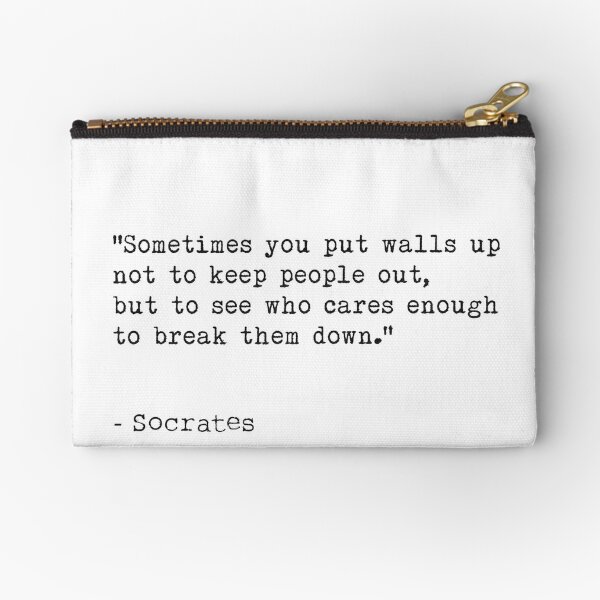In the realm of human relationships, vulnerability is often seen as a weakness. We build walls around ourselves, shielding our true selves from the world. However, Socrates, the ancient Greek philosopher, challenges this notion with his profound quote: “Sometimes you put walls up not to keep people out, but to see who cares enough to break them down.” In this article, we will explore the origin of this quote by Socrates and delve into its deeper meaning, shedding light on the transformative power of vulnerability and genuine connections.
The Origin of the Quote
The quote is attributed to Socrates, a renowned philosopher who lived in Athens during the 5th century BCE. Although his direct writings are scarce, his wisdom and teachings were preserved through the works of his disciple, Plato. Socrates believed in the pursuit of knowledge through open dialogue and self-reflection, emphasizing the importance of critical thinking and self-awareness.

Understanding the Profound Meaning
Socrates’ quote carries a profound message about human connection and the purpose of walls we build around ourselves. Let’s explore the layers of meaning behind this thought-provoking statement.
- Protective Vulnerability: Often, walls are associated with self-preservation, shielding us from potential harm or rejection. However, Socrates challenges this notion by suggesting that the purpose of these barriers is not to keep people out, but rather to test their commitment and sincerity. By putting up walls, we create a space for vulnerability, allowing only those who truly care to make the effort to understand and connect with us. It separates genuine connections from superficial ones, enabling us to build deeper, more meaningful relationships.
- Recognizing Authentic Relationships: The quote emphasizes the importance of discerning authentic relationships from those based on convenience or shallow intentions. By erecting barriers, we create an opportunity for others to demonstrate their willingness to understand and support us. Those who truly care and value our presence will make the effort to break down those walls, revealing their genuine intentions and fostering a bond built on trust and empathy.
- Growth through Vulnerability: The act of putting up walls and inviting others to break them down is an act of vulnerability. It requires us to confront our fears, insecurities, and past experiences of hurt or betrayal. By allowing someone to break through our defenses, we open ourselves up to the possibility of healing, growth, and genuine connection. It is through vulnerability that we can discover our true selves and forge deep bonds with others.
Expanding on the Topic
Expanding on the theme of vulnerability, we recognize that building walls is often a response to past hurts and disappointments. We may have experienced emotional pain, rejection, or betrayal, leading us to become guarded and skeptical. However, the quote encourages us to challenge this defensive stance by offering a different perspective.
- Testing Trust and Commitment: By erecting walls, we create a test for others to demonstrate their trustworthiness and commitment to the relationship. It allows us to filter out those who are unwilling or unable to invest the time, effort, and emotional energy required to truly understand and support us. It helps us avoid investing in relationships that are one-sided or lack depth.
- Encouraging Mutual Vulnerability: When someone demonstrates the willingness to break down our walls, it opens the door for reciprocal vulnerability. It creates a safe space for both individuals to share their fears, dreams, and insecurities. This mutual vulnerability fosters a deeper level of understanding, empathy, and connection, as both parties feel seen, heard, and accepted for who they truly are.
- Strengthening Emotional Resilience: The act of breaking down walls requires courage and emotional resilience. When someone cares enough to break through our defenses, it reaffirms our worth and validates our vulnerability. It teaches us that we are deserving of love and support, and it strengthens our ability to trust and form deeper connections in the future. It also allows us to develop resilience in the face of potential rejection or disappointment, as we learn to navigate the complexities of human relationships with grace and self-assurance.
- Embracing Authenticity: By putting up walls and inviting others to break them down, we embrace authenticity. We acknowledge our imperfections, fears, and past wounds, allowing others to witness our true selves. This level of vulnerability encourages others to do the same, fostering an environment of openness, acceptance, and growth. It creates space for genuine connections to flourish, as we engage with others on a deeper, more meaningful level.
Conclusion
Socrates’ quote, “Sometimes you put walls up not to keep people out, but to see who cares enough to break them down,” offers profound insights into the nature of human relationships. It challenges the notion that vulnerability is a weakness and highlights the transformative power of genuine connections. By putting up walls, we create an opportunity to test the authenticity and commitment of those around us, allowing only those who care enough to break through. This act of vulnerability not only fosters deeper relationships but also nurtures personal growth, resilience, and authenticity. So, let us embrace vulnerability, dismantle the barriers we’ve constructed, and open ourselves to the transformative power of genuine human connection.









